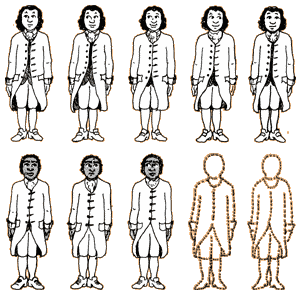
By the time of the Federal Convention in 1787, approximately one quarter of the population in the new nation was Afro-American. The majority of these Afro-Americans were slaves. Slavery existed in almost every state, although the greatest number of slaves lived in the South.
As early as 1765, George Mason had condemned slavery in Virginia. He called it "one of the first signs of decay" of a new government. During the Convention, he stated that the in-stitution of slavery brought out the worst quality in a white man, making him a "petty tyrant."
Other delegates were concerned with the power of the North and South in the new government and how the slave population would affect that power. This issue nearly put an end to the Federal Convention.
ACTIVITY
(in small groups)
You are delegates to the Federal Convention in Philadelphia. Half of the groups take the role of a plantation owner from South Carolina. The other groups take the role of a lawyer from Massachusetts.
Read the Profile of your "character." Then, discuss the issue of slave representation which faced the delegates at the Federal Convention.
PROFILES
Robert Lewis, Plantation Owner, South Carolina
(fictional delegate)
Robert Lewis owned 5,000 acres of farmland in fertile South Carolina. He grew rice and indigo which he sold to the northern states and abroad. It took a great deal of labor to plant and harvest these crops. Most of Lewis' 50 slaves worked in the fields.
Just under half of the inhabitants of South Carolina were slaves. Like other plantation owners, Lewis considered himself a fair master. He believed that he adequately fulfilled his slaves' basic needs: food, clothing, and shelter.
This delegate felt a sense of unity with the other states of this new country. After all, the states fought together for freedom. However, he was suspicious of northerners (and it wasn't all of them) who said that slavery was evil. It was easy for northerners to talk this way, he said. They didn't need slaves as much as southerners do.
Jonathan Lodge, Lawyer, Massachusetts
(fictional delegate)
Jonathan Lodge worked as a lawyer in the prosperous port city of Boston. He had never owned a slave and had little experience with slavery. (Slaves made up less than three per cent of the population in his state.)
Lodge was not concerned about the happiness or rights of slaves. However, he was concerned about the number of slaves in the South and how the South might use that number to its advantage.
A practical man, Lodge knew that slaves were the backbone of the agricultural system in the southern states. He worried that if the North interfered too much with slavery, the South would pull out of the Convention. He wondered, is a compromise possible? What might it be?
CONVENTION ISSUE
How should slaves be counted in determining the population of each state?
The delegates agreed that the number of members in the House of Representatives should be based on the number of inhabitants in each state. However, this raised the question: Should slaves be counted as part of the population? Or, should slaves be considered property and not as part of the population?
On the convention floor, Mason argued that slaves should be included as part of the population. Slaves contribute to the exports of a state, he pointed out. In time of war, they assist in supplying the food for an army and even become soldiers. Still, Mason opposed counting a slave as equal to a free man.
Delegate Oliver Ellsworth came up with a possible compromise. This was to count each slave as three-fifths of a free man.
Question: Summarize your delegate's views on slavery. Would your delegate vote "yes" or "no" on Ellsworth's proposal and why? If you vote "no," come up with another plan.
What do you think George Mason meant when he said that slavery makes a white man a "petty tyrant"? How do you think your delegate would react to this statement?
MORE
Class discussion: George Mason owned a large number of slaves and yet he opposed the institution of slavery. How could this be?
  |

